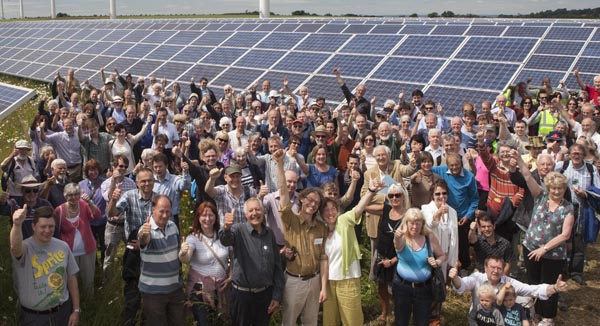Co-Operative Energy Boosted
New government policy and Community Energy England launched
Britain lags behind in the co-operative energy sphere. In Germany 46% of renewable generation is community owned, whereas in the UK it is a mere 0.3% or 70MW. In July Community Energy England was launched to try to redress the balance. There are already several inspiring projects, such as Repowering London’s Brixton Solar project (covered in blog https://blog.greenjobs.co.uk/2013/09/13/community-energy-is-it-the-way-forward/) but there needs to be a bigger part to play for the sector if it is to make an impact on reducing emissions, transitioning away from fossil fuels, and addressing fuel poverty.
Ed Davey, Secretary of State for Energy and Climate Change unveiled the UK Community Energy policy in January.“Independent modelling for DECC suggest that, by 2020, community electricity could generate between 0.5GW and 3GW from a mixture of solar PV, onshore wind and hydro projects representing between 2.2% and 14% of the total installed capacity of these technologies, and between 0.3% and 1.4% of the UK’s entire electricity consumption in 2020.”
Westmill Solar coop is a new solar energy park on an organic farm in Oxfordshire. The solar farm is rated at 5MW, consisting of 20,000 solar panels, which generates enough power for 1400 homes and prevents 2000 tonnes of carbon dioxide emissions. It raised its initial funding from 1,650 members, who now own and operate the Westmill Solar Park. The community is happy to be involved in this venture and it looks to be returning its investment ahead of expectations.
Although small-scale energy ventures like Brixton and Westmill are springing up all over Britain, their supporters find that it is an uphill struggle to get them off the ground, which is what Community Energy England aims to rectify. Philip Wolfe, Westmill Solar Board Chairman and interim lead for CEE says, “There are many obstacles in the UK, compared to Germany, Denmark and parts of the USA where community energy is much more common. We have been actively involved in the creation of Community Energy England, which has been established to address these barriers.”
As the energy crunch bites it will be interesting to see if more communities start to adopt their own energy generation systems.
http://communityenergyengland.org/
Visit Renewable Energy Jobs for the latest career opportunities



